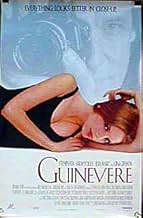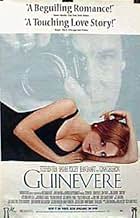IMDb RATING
5.9/10
2.8K
YOUR RATING
A young girl from an affluent family rebels and becomes involved with a much older photographer.A young girl from an affluent family rebels and becomes involved with a much older photographer.A young girl from an affluent family rebels and becomes involved with a much older photographer.
- Awards
- 2 wins & 7 nominations total
Sharon McNight
- Leslie
- (as Sharon Mcnight)
- Director
- Writer
- All cast & crew
- Production, box office & more at IMDbPro
Featured reviews
This was a slow moving but interesting story about a 50 something bohemian photographer named Connie Fitzpatrick (Stephen Rea) who is a serial seducer of impressionable young women. His seduction is not really about sex, although that is part of it. Instead, it is more of an emotional seduction that involves his creating a symbiotic mentor/protégé relationship that puts him in control while feeding his ego. His latest conquest is Harper Sloane (Sarah Polley), a recent college grad from a wealthy family who is all set to go to Harvard Law School. Clearly lonely and vulnerable and not used to the attention of men, she falls prey to the charms of this free spirited older man and eschews law school to run off with him and live the artsy life.
Director/writer Audrey Wells, whose best previous writing credits were for "The Truth About Cats and Dogs" does an excellent job bringing this story to the screen in her directing debut. Her shooting of the scenes was sensitively done and brought forth a lot of the emotional elements of the story and the characters. It is clear that this was a labor of love for Wells, but as is often the case, directing one's own work takes away the objectivity about the script leaving most of the plot problems intact.
It is believable that an insecure girl could be lured into a relationship by a charming older man who overtly appreciates her and believes in her abilities. May/September romances (or more aptly in this case April/August) are common and usually happen for all the reasons depicted here. The biggest problem with the story was the introduction of Billie (Gina Gershon), one of Connie's earlier alumni, so early in the story. Billie warns Harper of the specific manipulative lines that Connie uses repeatedly with each of his love interests, almost by rote. She gives great detail right down to the way he touched her and the fact that he calls them all Guinevere.
At that point, Harper does exactly what one might expect, she leaves him. Shortly thereafter, the story loses all credibility as she eagerly goes running back to him, knowing full well that she is being totally and impersonally manipulated. The entire relationship after that waits for an emotional explosion that never comes. The whole thing just sort of withers away with the eventual breakup being no more than a fait accompli. The breakup scene was weak and cowardly, which detracted greatly from the dramatic potential. If Wells had put Billie's scene closer to the end of the story to create the last straw it would have been more effective.
Wells also misses a great opportunity to add fireworks by not emphasizing Harper's relationship with her mother (Jean Smart). There was a natural emotional tension between the two and she was the one character who had complete clarity about the relationship. Finally, without giving too much away, the gathering of the five Connie alumni at the end was a bit goofy and highly implausible given the gravity of the situation. However, Wells does eventually redeem herself with a good ending and some of the best imagery of the film.
Sarah Polley was well cast in this film and exuded the pure naivety of a young woman inexperienced in the ways of love. She was wonderfully awkward and vulnerable and it was very believable that she could fall prey to the ministrations of an older man. Polley has a Winona Ryder quality about her and has excellent potential as an actress. It remains to be seen if she can break out of the role of quirky teen.
Stephen Rea was hopelessly miscast in this role. He didn't have the emotional horsepower to play this character. His acting is somewhat stoic and wooden and this character needed to be charming, passionate and obsessive. The part required an actor more like Michael Caine.
The best performance of the film goes to Jean Smart as Harper's outspoken and gregarious mother. She completely steals the movie with her confrontational scene with Connie, explaining to him why he can't make it with women his own age. She is terrific in every scene she is in and the fortune cookie scene is fantastic.
Overall, I rated this film a 7/10. This film will probably be most appealing to men over 50 and women under 25. None of the flaws were fatal, but the pace was slow and the plot implausible in parts. That detracted from an otherwise engaging story and some very good technical filmmaking.
Director/writer Audrey Wells, whose best previous writing credits were for "The Truth About Cats and Dogs" does an excellent job bringing this story to the screen in her directing debut. Her shooting of the scenes was sensitively done and brought forth a lot of the emotional elements of the story and the characters. It is clear that this was a labor of love for Wells, but as is often the case, directing one's own work takes away the objectivity about the script leaving most of the plot problems intact.
It is believable that an insecure girl could be lured into a relationship by a charming older man who overtly appreciates her and believes in her abilities. May/September romances (or more aptly in this case April/August) are common and usually happen for all the reasons depicted here. The biggest problem with the story was the introduction of Billie (Gina Gershon), one of Connie's earlier alumni, so early in the story. Billie warns Harper of the specific manipulative lines that Connie uses repeatedly with each of his love interests, almost by rote. She gives great detail right down to the way he touched her and the fact that he calls them all Guinevere.
At that point, Harper does exactly what one might expect, she leaves him. Shortly thereafter, the story loses all credibility as she eagerly goes running back to him, knowing full well that she is being totally and impersonally manipulated. The entire relationship after that waits for an emotional explosion that never comes. The whole thing just sort of withers away with the eventual breakup being no more than a fait accompli. The breakup scene was weak and cowardly, which detracted greatly from the dramatic potential. If Wells had put Billie's scene closer to the end of the story to create the last straw it would have been more effective.
Wells also misses a great opportunity to add fireworks by not emphasizing Harper's relationship with her mother (Jean Smart). There was a natural emotional tension between the two and she was the one character who had complete clarity about the relationship. Finally, without giving too much away, the gathering of the five Connie alumni at the end was a bit goofy and highly implausible given the gravity of the situation. However, Wells does eventually redeem herself with a good ending and some of the best imagery of the film.
Sarah Polley was well cast in this film and exuded the pure naivety of a young woman inexperienced in the ways of love. She was wonderfully awkward and vulnerable and it was very believable that she could fall prey to the ministrations of an older man. Polley has a Winona Ryder quality about her and has excellent potential as an actress. It remains to be seen if she can break out of the role of quirky teen.
Stephen Rea was hopelessly miscast in this role. He didn't have the emotional horsepower to play this character. His acting is somewhat stoic and wooden and this character needed to be charming, passionate and obsessive. The part required an actor more like Michael Caine.
The best performance of the film goes to Jean Smart as Harper's outspoken and gregarious mother. She completely steals the movie with her confrontational scene with Connie, explaining to him why he can't make it with women his own age. She is terrific in every scene she is in and the fortune cookie scene is fantastic.
Overall, I rated this film a 7/10. This film will probably be most appealing to men over 50 and women under 25. None of the flaws were fatal, but the pace was slow and the plot implausible in parts. That detracted from an otherwise engaging story and some very good technical filmmaking.
5n8
Technically, Ms. Wells has a superb film here. The cinematography is innovative and germane to the story. The actors all give enjoyable and appropriate performances. The storyline, however, leaves a bit to be desired. I imagine that feminist critics would have a hey-day with this one. I don't buy it. I don't believe the relationships in the film are genuine and honest - it just doesn't work. Ms. Wells explained after the show that she works from a theme and creates her movies that way, and from that perspective, the movie works. If one only looks at the movie for the theme and disregards most other concerns, s/he will love this film. I was disappointed.
Writer/director Audrey Wells, who would go on to make 2003's "Under the Tuscan Sun" as well as the recent "Shall We Dance", directed Sarah Polley in 1999's "Guinevere". Wells' forte seems to be characters in search of romance who find it in unexpected places. It was the 'ugly' girl in "Truth About Cats & Dogs", Italy in "Tuscan Sun", and the older man in this film. That older man is played with wild abandon by Stephen Rea, often inappropriately stealing the show. Ignoring Jean Smart's histrionic heavy scene later in the film, and the control Rea's Connie has over Polley's Harper, this is Sarah Polley's film. What make this film work is its sensitivity and subtly, especially toward Harper's youth, naivete, and uncertainty in love and life. It's a sweet film about self-discovery at any age, and although it gets a bit moody toward the end, it works well as a date movie.
I can't say exactly what, but something is missing in this movie. Poor Connie. I think he gets less out of the relationships than the Guineveres. Maybe I like things "tied up" too much, but I wish we'd seen a little of Harper's work so we could judge just how well Connie taught her. A scene of her in a gallery or studio somewhere surrounded by her work as she answers a ringing telephone (presumably with Billie on the other end) would have been satisfying--no dialog necessary, just a look of sadness on her face. Whatever else, this movie sure spurred some dialog between my 25-year-old daughter and me.
Interesting that (along with another reviewer) I saw the connection between the Stephen Rea character, Connie, in this movie and Herman Wouk's Noel Airman in the 50's novel "Marjorie Morningstar" and talked about that as we walked home. And as big a bitch as Harper's mother was, she had it right as she saw through Connie. Beautifully acted by all principals!
Interesting that (along with another reviewer) I saw the connection between the Stephen Rea character, Connie, in this movie and Herman Wouk's Noel Airman in the 50's novel "Marjorie Morningstar" and talked about that as we walked home. And as big a bitch as Harper's mother was, she had it right as she saw through Connie. Beautifully acted by all principals!
I just saw of this film at the Montreal World Film Festival. Stephen Rea and Sarah Polley were in attendance. You could not ask for two better actors. Rea plays a 45-50ish photographer who seduces 20 yr. old Sarah Polley to give up her law school career and become an artist and his live-in- lover.
The director and writer, Audrey Wells, also directed and wrote The Truth About Cats and Dogs. I intensely disliked that film because it was implausible, not grounded in any reality, and because even the luminous Jeneane Garafalo couldn't save it. Audrey Wells also wrote Inspector Gadget; clearly, her writing leaves something to be desired. In this film she manages to put interesting situations (May-September romance / high vs. low class) forth but whenever they approach any hard edges here comes the soft humour or easy way outs or just plain ambiguously unrealized character motives. Polley's character would get to say one disturbing or strong thing, then have go on acting so obviously well below her & her character's intelligence.
I consistently thought scenes were misdirected and that the writing gave up on itself and fell into cliche, sapping it of any force it had. And with the potential force between these two great actors never realized it was a sad loss. This is no Lolita or Educating Rita. Consider even the ballyhooed scene were Jean Smart, in a good job, takes down Rea's character in front of her daughter (the 'awe' scene.) The camera focusses intently on Smart's malice. Think how much better that little diatribe would be if we were watching *Polley's* reaction while hearing the *mother's* words. That would be a real dislocation. Then we could see the full range of which Polley is absolutely capable.
Also, the soundtrack music was very synthetic and touchy-feely and it worked completely against the (potentially) creepy aspect of the film, until the white-light hogwash of the end. But if you liked all that white-light business in "Kissed" & if you could tolerate the preposterous situation of Cats & Dogs, then maybe you will like this film. As it was, I found it singularly unconvincing, the moreso as it went along.
ps. Sandra Oh is very funny with the two minutes of screen time she gets. Sandra Oh is always excellent. If you want to see a good Sarah Polley & Sandra Oh film, rent "Last Night". It's brilliant. For Stephen Rea, look forward to his next Neil Jordan film.
The director and writer, Audrey Wells, also directed and wrote The Truth About Cats and Dogs. I intensely disliked that film because it was implausible, not grounded in any reality, and because even the luminous Jeneane Garafalo couldn't save it. Audrey Wells also wrote Inspector Gadget; clearly, her writing leaves something to be desired. In this film she manages to put interesting situations (May-September romance / high vs. low class) forth but whenever they approach any hard edges here comes the soft humour or easy way outs or just plain ambiguously unrealized character motives. Polley's character would get to say one disturbing or strong thing, then have go on acting so obviously well below her & her character's intelligence.
I consistently thought scenes were misdirected and that the writing gave up on itself and fell into cliche, sapping it of any force it had. And with the potential force between these two great actors never realized it was a sad loss. This is no Lolita or Educating Rita. Consider even the ballyhooed scene were Jean Smart, in a good job, takes down Rea's character in front of her daughter (the 'awe' scene.) The camera focusses intently on Smart's malice. Think how much better that little diatribe would be if we were watching *Polley's* reaction while hearing the *mother's* words. That would be a real dislocation. Then we could see the full range of which Polley is absolutely capable.
Also, the soundtrack music was very synthetic and touchy-feely and it worked completely against the (potentially) creepy aspect of the film, until the white-light hogwash of the end. But if you liked all that white-light business in "Kissed" & if you could tolerate the preposterous situation of Cats & Dogs, then maybe you will like this film. As it was, I found it singularly unconvincing, the moreso as it went along.
ps. Sandra Oh is very funny with the two minutes of screen time she gets. Sandra Oh is always excellent. If you want to see a good Sarah Polley & Sandra Oh film, rent "Last Night". It's brilliant. For Stephen Rea, look forward to his next Neil Jordan film.
Did you know
- TriviaDuring the non-union shoot in San Francisco, crew members struck and were joined by star Sarah Polley, who walked the picket line. Striking crew members report that they were quite touched by her action, which was more than a gesture, but rather a sincere belief in workers' rights. On her part, Polley called her union, the Screen Actors Guild, to tell them of her action, and the union representative told her they'd back her if she crossed the picket line. SAG assumed that she was calling to ask whether she could defy the strike and cross the picket line! A shocked and dismayed Polley stayed out with the strikers, and the strike ended after three days when their grievances were met. Subsequently, Polley has stated that she has been told that she lost several job offers due to this incident as producers don't want a union 'militant' despite the film industry being a craft industry dominated by the guild (union) system and she did what she felt was right.
- GoofsThe wet spots on Harper's shirt after taking a shower. They're inconsistent.
- Quotes
Harper Sloane: You're obviously mistaking me for someone with potential.
- SoundtracksCoquette
Music by Carmen Lombardo & Johnny Green
Lyrics by Gus Kahn
Performed by John Pizzarelli
Courtesy of The RCA Records Label of BMG Entertainment
- How long is Guinevere?Powered by Alexa
Details
Box office
- Budget
- $2,600,000 (estimated)
- Gross US & Canada
- $632,283
- Opening weekend US & Canada
- $54,145
- Sep 26, 1999
- Gross worldwide
- $635,680
- Runtime1 hour 44 minutes
- Color
- Sound mix
- Aspect ratio
- 1.85 : 1
Contribute to this page
Suggest an edit or add missing content

Top Gap
By what name was Une histoire d'initiation - Guinevere (1999) officially released in India in English?
Answer































